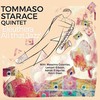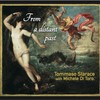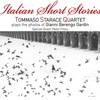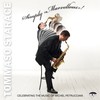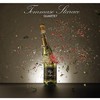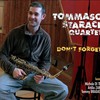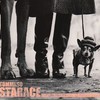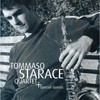DFR Dont Forget Liner Notes
Aug. 2009 By Vittorio Franchini (Jazz Author)
Whether it be recorded or live, there is always a heavy sense of ambiguity when listening to a young musician who is well spoken of but who hasn’t yet actually produced too much. So it was when I listened to this CD by the saxophonist Tommaso Starace, even though the three maestri who accompany him leave no room for doubt. Michele Di Toro on the piano, Attilio Zanchi on the double bass and Tommy Brandascio on the drums would definitely not have accepted if they hadn’t been convinced of both the young player’s solid skill on the instrument and his creativity. So I listen: he starts with a solo and I am immediately reminded of great music, from Coleman Hawkins to Sonny Rollins. Why make life complicated? I listen. The sound is full and nimble, the language fresh, coming from the past but with a light vein of novelty, almost as though the musician was anxious not to go too far. The theme is then taken up by the quartet and the cards are on the table. A great rhythmic section follows with solos, particularly those of Di Toro, cocooned in a dry romanticism, replete with images and with Zanchi and Brandascio to add tension, invent rhythms. Dynamic, inventive: I try to shut the sax out of my mind in order better to understand the construction of the themes, to let myself be carried away by the atmosphere and then, when I let the sax resume its predominance, I seem to be in a kind of dizzy dream, almost as though the soloist were somehow conjuring up the visions of others, not only his own. One of the titles, “Farewell Capa” gives me a clue: music dedicated to a poet of photography? And what a poet, pitiless in the rawness of certain images, but always painfully bound to life, always full of a thousand tender details that reconnect his images to the dream. While concentrating on the sax I learn that Starace in England dedicated a CD to another great photographer, Elliott Erwitt: I am overwhelmed by memories of my days at the Corriere when I wanted to see all the photos that were sent in and meet the photographers, to understand their ambitions, their plans, their sense of life; we would talk for hours, creating a close, fraternal bond. I understand that these images could also distract me from listening to the sax, to Erwitts advantage. Nostalgia can sometimes distort, create illusions. So I listen: my ears are crowded with the voices of many other saxophonists. He has borrowed from this one, from that, he copies, invents, does he finally free himself of his awe of those great examples? I am tempted to think that the job of judging music is a fruitless one, particularly now that the barriers have come down and you can go from one world to another, even copy, without scruple: quote, quote and quote again. I listen some more. The quartet has a pleasant sound. There is a sax solo sustained by an evocative drum accompaniment, the bass throbs continuously, Di Toro chases it up with his piano that seems to contain the very history of jazz, Starace plays as though seized by a sudden raptus and one is aware of the joy of playing, the ability to enjoy, which means only one thing. That sax is filled with voices, it sings of gaiety, but at the same time there are moments of misty melancholy that give way to a saga of old songs. I listen. I am still not sure whether this Starace will become a truly great musician, but I like the way he follows joyful paths, I imagine him playing around with the rhythms, playing with the other instruments, opening up to new feelings and inventing new ways. Loving what he plays, every note, every whisper as though he had invented each melody, each hue and song and was prepared to offer all his inventions to everybody




